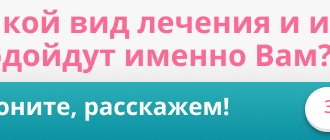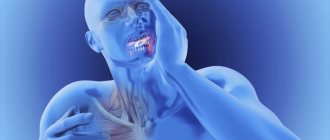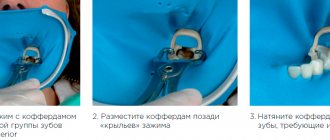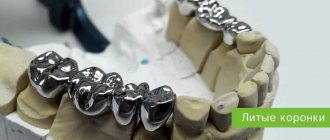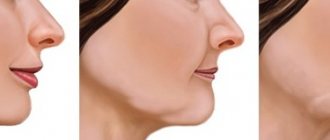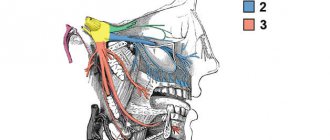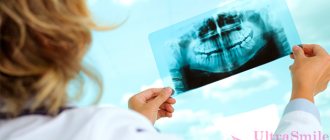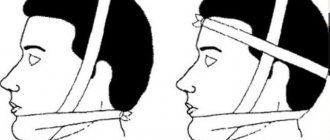Trismus of the masticatory muscles is a severe spasmodic condition when the temporomandibular joint is immobilized, the masticatory muscles are very tense, they become stone-like, the teeth are clenched, and the patient cannot open his mouth freely. In such cases, urgent dental care is necessary, since the person can neither eat nor drink, respiratory function is impaired, and severe pain is felt. It is very important to provide emergency dental care as quickly as possible, since trismus puts a lot of stress on the nervous system, jaw, teeth and gum tissue.
The main causes of trismus
Often the causes of trismus are diseases that are localized near the jaw:
- osteomyelitis of the jaw;
- inflammatory process of masticatory muscles;
- jaw injuries;
- periostitis;
- advanced caries, extensive carious damage to teeth;
- inflammation of the gum tissue;
- acute stage of pulpitis;
- inflammation of the periosteum of the lower jaw;
- abscesses.
Compression can also occur in the background:
- neurosis;
- brain inflammation;
- cerebrospinal meningitis;
- epileptic seizures;
- paralysis;
- cerebral hemorrhages;
- rabies;
- muscle cramps;
- tetanus;
- tumor processes;
- hysteria.
Sometimes the disease can occur due to a direct blow to the jaw area, due to an unexpected dousing with cold water. Often a spasm occurs after an animal bite (one of the consequences of rabies).
Complications
Many infectious and traumatic causes of trismus may also have associated complications; for example, an odontogenic infection causing trismus may be further complicated by facial cellulitis or mandibular osteomyelitis. Trismus can also interfere with proper oral intake and hydration. In addition, trismus may be associated with aspiration due to impaired swallowing mechanisms. It should also be noted that oropharyngeal intubation may not be possible in patients with significant trismus, requiring other approaches such as nasopharyngeal intubation or tracheotomy. As the duration of the condition increases, trismus can lead to fibrosis of the TMJ, requiring targeted therapy.
Symptoms and degrees of trismus
- sharp contraction of the jaw;
- the patient cannot open his mouth;
- teeth are tightly clenched;
- severe pain when unclenching teeth;
- swelling and hardening of the muscle;
- breathing problems;
- speech problems;
- inability to eat normally;
- The lower part of the face may hurt, with severe pain spreading to the neck and back.
There are several stages of trismus:
- the first – when a person can open his mouth 30-40 mm;
- second – if a person is able to open his mouth slightly by 10-20 mm;
- the third is the most difficult, when the mouth opens less than 10 mm.
The consequences of strong clenching of the jaws can be chipping, loss of teeth, damage to enamel and dentin.
Diagnosing trismus requires a qualified approach, since the disease’s symptoms are similar to other problems. For example, with inflammatory processes (arthrosis) of the jaw joint or a fracture of the jaw. In this case, only an experienced traumatologist will help. To examine the oral cavity, the patient is given an injection of botulinum toxin, which has a relaxing effect on the chewing muscles and provides pain relief.
Forms
There are three degrees of trismus:
- easy – the mouth opens, the distance between the central incisors is 3-4 cm;
- medium – the mouth opens 1-2 cm;
- severe – inability to open the jaws, mouth opening less than 1 cm.
Since diagnosis requires a visual examination of the oral cavity, Botox is injected into the inflamed area. Otherwise, unclenching your teeth is problematic.
How to treat trismus of the masticatory muscle?
Treatment involves the following steps:
- jaw immobilization;
- elimination of the disease or condition that caused trismus;
- taking medications with a relaxing effect (neuropsychic stimulants);
- taking antibiotics;
- the patient takes sedatives;
- Physiotherapy is recommended.
If trismus is caused by an inflammatory process in the mouth, the dentist sanitizes the lesion (for example, opens an abscess), cleans the hole and, if necessary, removes the tooth along with the root.
Why does my jaw cramp?
Among the causes of spasm in dental practice are the following:
- consequences of mandibular anesthesia - formation of a blood clot after an injection;
- complication of maxillofacial operations. For example, irritation of the trigeminal nerve during removal;
- inflammatory processes affecting periodontal tissues, jaw bones and joints: pericoronitis, periostitis, etc.;
- purulent tumors that have spread to bone tissue;
- fracture or dislocation of the lower jaw.
In some cases, trismus manifests itself as a sign of a number of disorders and pathological conditions, such as tetanus, meningitis, paralysis, epilepsy, brain tumors, neuralgia (damage) of the trigeminal nerve, etc.
Symptoms of paratonsillar abscess
The typical clinical manifestation of PTA is severe sore throat (usually unilateral), fever, and muffled voice. Patients may also complain of drooling and difficulty swallowing.
Trismus (spasm of the masticatory muscles), associated with irritation and reflex spasm of the internal pterygoid muscle, occurs in almost 2/3 of patients and is an important distinguishing feature of PTA in comparison with severe acute tonsillopharyngitis. Patients may also complain of neck swelling and ear pain on the affected side.
Pathophysiology
The muscles responsible for closing the mouth, namely the masseter, temporalis and medial pterygoid muscles, are 10 times stronger than the muscles responsible for opening the mouth, including the lateral pterygoid, digastric and hypoglossal muscles. The innervation of most of these muscles is provided by the mandibular division of the fifth cranial nerve. The muscle groups that control the opening and closing of the jaw act antagonistically, since neurogenic stimulation of one group causes reflex neural inhibition of the other. Although the precipitating disturbance may be unilateral, the activated reflex is bilateral.
Diagnostics
In the vast majority of cases, the diagnosis of PTA is made clinically, based on the results of pharyngoscopy (examination of the pharynx). It is confirmed by obtaining purulent discharge during drainage of the abscess or by instrumental studies (most often ultrasound).
Pharyngoscopy reveals a swollen and/or fluctuating tonsil with deviation of the uvula in the direction opposite to the lesion, hyperemia (redness) and swelling of the soft palate. In some cases, there is plaque or liquid discharge in the palatine tonsil. There is an increase and tenderness of the cervical and submandibular lymph nodes.
Bilateral PTA is extremely rare and its diagnosis is more difficult due to the lack of asymmetry in the pharynx, as well as the rarely present spasm of the masticatory muscles.
Laboratory tests are not required to make a diagnosis; they are additionally prescribed to determine the severity of the disease and select a treatment method.
Laboratory tests may include:
- general blood test with leukocyte formula;
- study of electrolytes (potassium, sodium, chlorine) for signs of dehydration;
- strepta test to exclude GABHS;
- culture for aerobic and anaerobic bacteria if the abscess was drained (culture is recommended only for complicated PTA, recurrent PTA, or in patients with immunodeficiency conditions).
Instrumental examination methods - ultrasound, computed tomography, lateral neck x-ray, magnetic resonance imaging or angiography - are not necessary and are performed to exclude other diseases if the diagnosis of PTA is not obvious.
Prognosis for recovery and prevention
Trismus of the masticatory muscles of local origin has a good prognosis for complete recovery. Properly selected and timely treatment of the pathology relieves muscle tension and restores the motor function of the temporomandibular joint within 1 to 3 weeks.
With internal diseases, it is more difficult to predict recovery. Infection with the rabies virus in humans is most often fatal. There is also a risk of mortality with tetanus.
Prevention of spasm of the masticatory muscles will be timely treatment of inflammatory processes in the oral cavity.
Vaccination against rabies and tetanus will not only prevent trismus, but also help save the patient’s life.
It is necessary to protect mental health and avoid injuries to the lower jaw.
Dehydration also contributes to the occurrence of trismus, so you should drink at least 1.5 liters of water daily.
Proper nutrition will provide the body with the required amount of nutrients, vitamins and microelements. A healthy lifestyle, physical exercise and sports will help strengthen muscles and prevent tonic spasm of the masticatory muscles.
Treatment of peritonsillar abscess
In case of a complicated course, children (especially young children) are indicated for hospitalization and treatment in a hospital setting.
The main treatment method for PTA is systemic antibacterial therapy. In severe cases, severe intoxication, difficulty swallowing, nausea, antibacterial therapy is prescribed parenterally (bypassing the gastrointestinal tract) with subsequent transfer to oral forms of drugs - until the completion of the 14-day course of treatment. Courses of antibiotic therapy for less than 10 days increase the likelihood of disease relapse.
After prescribing systemic antibiotic therapy, dynamic observation for 24 hours is recommended. It is acceptable in patients with suspected paratonsillitis, without obvious signs of PTA, without signs of airway obstruction, sepsis, severe spasm of the masticatory muscles, or other signs of a complicated course of the disease. And also in children under 7 years of age with small abscesses and rare episodes of acute tonsillopharyngitis in history.
Studies have shown that systemic antibiotic therapy is effective even without draining the abscess. According to available data, 50% of children responded to systemic antibiotic therapy and did not require abscess drainage or tonsillectomy.
Systemic antibacterial therapy should include antibiotics active against GABHS, Staphylococcus aureus and respiratory anaerobes. For PTA, amoxicillin-clavulanate, ampicillin-sulbactam, and clindamycin are most often prescribed. If there is no or severe response, vancomycin or linezolid is added to treatment to ensure optimal coverage of potentially resistant Gram-positive cocci.
Prognosis and prevention
Trismus of the lower jaw, which occurs after anesthesia, as a result of inflammatory processes in the oral cavity or trauma, has a favorable prognosis. In most cases, the functions of the masticatory muscles are restored within 1-3 weeks.
With systemic diseases, the chances of full recovery are lower. The worst prognosis for rabies is that the disease almost always ends in death.
In order to prevent trismus, it is necessary to promptly eliminate inflammatory foci in the oral cavity, vaccinate against tetanus and rabies, and prevent injuries and stressful conditions.
What is muscle spasm, its types and causes
Muscle spasms are involuntary contractions of muscle tissue. Unlike natural contractions (for example, during the digestion of food, during exercise, swallowing water), spasms occur without any external or internal cause, in the absence of a person’s desire, and unpredictably.
As a rule, muscle spasms in the head area affect the temples, forehead, and back of the head. Involuntary contractions of the masticatory muscles can occur due to the use of stimulants (caffeine, taurine, narcotics) or for internal physiological reasons. In the second case we are talking about:
- trismus - a spasm that provokes a tight clenching of the jaws;
- bruxism - involuntary muscle contractions that occur mainly during sleep, at night, and are accompanied by grinding of the upper and lower rows of teeth.
Muscle spasms in the cervical spine can be either unilateral or bilateral. They are often associated with pinched nerves or spinal pathologies (for example, a hernia).
Advantages
Smart medicine for smart people
Safe, effective and natural rejuvenation
The best technologies for communicating with patients
We don't just take care of your beauty - we recharge you!
Types of head muscle spasms:
- episodic involuntary muscle contractions: headache, neck muscle pain lasts no more than 14 days over a period of 1 month;
- chronic spasms: 15 days a month or more.
Typically, the causes of spasms in the muscles of the head, jaws, and neck are:
- metabolic disease;
- lack of physical activity;
- diseases of the musculoskeletal system;
- vascular pathologies;
- deficiency of vitamins, microelements;
- stress: physiological, psychological, emotional stress;
- hypothermia;
- increased body temperature;
- obesity;
- genetic predisposition;
- injuries;
- pinching of nerve fibers.
For what reasons can a spasm develop?
As already mentioned, the problem in question usually occurs when the trigeminal nerve is irritated or damaged. In this case, the cause of cramps can be either a dental disease or a systemic pathology of the body. Experts highlight a list of key factors that lead to a sharp reduction in the masticatory muscles:
- advanced stages of caries, pulpitis, inflammatory diseases of teeth and gums affecting periodontal tissues,
- jaw injuries,
- diseases of the ENT organs,
- brain pathologies, including tumors,
- trigeminal neurosis,
- inflamed periosteum (true for the lower jaw),
- a consequence of the administration of an anesthetic or a surgical operation, for example, after the removal of a wisdom tooth,
- arthrosis
Trauma may cause the problem
“This happened to me once when I was yawning. My jaw tightened, the pain was terrible. I could neither open nor close my mouth. All this lasted about half an hour. I read a relaxing massage technique on the Internet, and in my opinion, that was the only thing that saved me. If the cramp had lasted for at least a couple more minutes, I would have definitely run to the doctors.”
Anatoly K.B., Moscow, from correspondence on the forum www.32top.ru
Other reasons for the appearance of an unpleasant symptom include jaw injury due to an impact, as well as a sharp temperature change. Also, a similar condition is observed in the early stages of the development of such serious diseases as tetanus and rabies. Trismus is one of the characteristic symptoms of an epileptic attack.
Signs of involuntary muscle contraction are:
- with bruxism – grinding of teeth during sleep, a feeling of overexertion in the jaws after waking up;
- with spasms of the head muscles - hoop-shaped pain in the temples, in the forehead, in the back of the head;
- pressing, pulsating, squeezing nature of pain;
- feeling of heaviness in the area of spasm;
- pain when pressing trigger points (try to palpate the area of the head when it hurts: when you press certain points, the pain increases significantly);
- nausea, vomiting, dizziness;
- painful reaction to light, loud sounds (infrequently).
When to see a doctor:
- headaches appeared suddenly and do not go away;
- you are experiencing muscle pain for the first time after 50 years;
- pain is accompanied by dizziness, weakness, numbness of the limbs;
- pain lasts more than two weeks in a row;
- painkillers either do not work at all or give an insignificant short-term effect;
- the pain is localized on one side of the head/neck.
Muscle spasms that provoke pain indicate a disruption in the healthy functioning of the body. To prevent the development of the disease, it is important to consult a doctor in time. We advise you to visit a therapist, neurologist, endocrinologist, who will prescribe detailed laboratory diagnostics for you. Based on the research results, specialists of another profile may be involved in your treatment: an orthopedist, a cardiologist, a chiropractor. Complex treatment may include taking medications, a massage course, and therapeutic exercises. A good doctor will definitely give you recommendations on nutrition and daily routine.
MIGUNOVA ANASTASIA ANDREEVNA
Cosmetologist
Initial consultation: 4500 rub.
VYATKINA IRINA SERGEEVNA
Gynecologist-endocrinologist
Initial consultation: RUB 8,500
KALININA EKATERINA ALEXANDROVNA
Cosmetologist
Initial consultation: 4500 rub.
KOZLOVA EKATERINA NIKOLAEVNA
Gynecologist, oncologist
Initial consultation: 5000 rub.
KUSRAEVA DIANA TEYMURAZOVNA
Cosmetologist, dermatovenerologist
Initial consultation: 4500 rub.
What can you do at home if:
Head muscle spasms
To relieve spasm and pain, you can take aspirin, a painkiller tablet like Ibuprofen, or a painkiller in powder form (for example, Nimesil). Give yourself peace of mind. You can try pressing trigger points and stretching your earlobes.
Jaw muscle spasm
If trismus manifests itself, before the doctor arrives, you can self-massage the masticatory muscles, accelerating the blood in them, alternately pressing on the muscles constrained by spasm. It is also possible to use compresses (alternate warm and cold compresses, apply them to the lower third of the face).
Cervical muscle spasms
Make gentle rotational movements with your head, lower and lift it (without throwing it back too much), turn it right and left. You can try stretching your neck muscles with your hands. Warm compresses and rubbing are effective.
*Attention! The information is for informational purposes only and does not constitute medical advice.
Reviews
Tatiana
I’m happy to be among your guests at the clinic, I enjoy our communication, I’m grateful for your super professionalism, for giving beauty and a sense of confidence in your professional actions, protection from “age-related changes”?! I admire the combination of beauty, tenderness, intelligence, and fortitude! With respect, gratitude and love???
Olga
A modern clinic with friendly staff and highly professional doctors. I received a consultation on facial rejuvenation, a procedure was proposed that completely satisfied me, the consultation was very detailed. Satisfied with the visit.
Irina Nikolayevna
Clean, comfortable clinic, polite staff, professional specialists. The services are of excellent quality, I have been using the services for almost a year and a half, and have never had any problems with parking.
Anna and Alexander
Marina Vladimirovna, we wanted to express our gratitude to you for the Fotona 2D rejuvenation procedure. The skin is just super, and the scars on both of them are noticeably better. My husband says every day how beautiful and smooth his skin is, his nasolabial folds have disappeared. We are very pleased, we will come to you again!
What you can do on your own
In case of a hypertensive crisis, as well as in such dangerous pathological conditions as tetanus or rabies, the patient needs immediate medical attention. In other situations, if the spasm lasts too long or the attacks are repeated on a systematic basis, it is worth making an appointment with a doctor. To alleviate the condition, you can use the following recommendations:
- a painkiller tablet will help relieve pain,
- a warm compress will relax the muscles - to do this, just take a small container with warm liquid and bring it to the sore spot. This will stimulate blood circulation and eliminate spasm,
- a cold compress will help relieve inflammation - about 5-10 minutes after the warm compress, the sore spot should be cooled. This will reduce inflammation and pain,
A compress will help relieve spasms - Massaging the chewing muscles will help stretch the muscles and relax them a little - to do this, feel the soft area on the cheeks with your fingertips, closer to the lower jaw. You need to massage with light movements for half an hour,
- try not to think about the bad and just relax - stress is one of the key factors of the problem.
If the attack lasts a long time and causes severe pain, be sure to go to the doctor. In some cases, self-medication can lead to even more serious complications.
Drug treatment for muscle spasms
There is no universal remedy for muscle spasms of the head and neck. If the pain is episodic, taking painkillers in combination with supplementation with vitamins and minerals may be enough. If we are talking about chronic involuntary muscle contractions, the patient may be prescribed antiepileptic drugs, muscle relaxants, antidepressants, and antipsychotics. The doctor may also recommend medications to strengthen blood vessels and normalize blood circulation.
All patients with muscle pain are advised to ensure sufficient physical activity, avoid alcohol consumption, reduce stress levels, eat nutritiously and get enough sleep.
